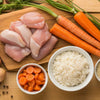What Happens If a Puppy Eats Adult Dog Food?
- Houndsy
Table of Contents
- Introduction
- The Nutritional Differences: Puppy vs. Adult Dog Food
- What Happens If a Puppy Eats Adult Dog Food?
- Monitoring Your Puppy’s Health
- When to Transition from Puppy Food to Adult Food
- Our Commitment to Companion Nutrition
- FAQs
Introduction
As new puppy parents, we often find ourselves inundated with questions about our furry companions’ health and well-being. A tangle of concerns unravels when it comes to nutrition, especially one of the most pressing: what happens if a puppy eats adult dog food? It’s a common scenario for pet owners who may run out of puppy food or mistakenly mix up the bags. So, will it harm our little bundles of joy?
The reality is that while adult dog food isn’t toxic to puppies, feeding them such products poses risks and can lead to health complications. This topic is significant because the nutritional needs of puppies differ vastly from those of adult dogs, affecting their growth and overall health.
By the end of this blog post, we’ll delve into the differences between puppy and adult dog food, what to expect if our pups munch on the wrong food, and how to properly transition them as they grow. Moreover, we’ll offer insights into creating the optimal eating environment that aligns with our mission at Houndsy: to elevate and simplify the feeding experience for pet parents and their beloved dogs.
The Nutritional Differences: Puppy vs. Adult Dog Food
It’s essential to understand that puppies and adult dogs have very different dietary requirements. Puppies grow rapidly, undergoing physical changes that adults have already completed. This means their food must be tailored specifically to meet their developmental needs. Let's take a closer look at some of the major differences:
Protein and Amino Acids
Puppies require higher protein levels than adult dogs for muscle and organ development. The protein in puppy food is specially formulated with the right balance of amino acids, crucial for their growth. In contrast, adult dog food contains lower protein percentages, which might not support a puppy's rapid growth adequately.
Fats: Energy Sources
Fat serves as a primary energy source for puppies, delivering twice as many calories per gram than proteins or carbohydrates. Puppy food typically has higher fat content, necessary for puppies’ active lifestyles and to help absorb fat-soluble vitamins. Adult dog food may not provide the requisite fat levels, risking insufficient energy for playful playtimes.
Essential Fatty Acids
Omega-3 fatty acids, particularly DHA (docosahexaenoic acid), are vital for the cognitive development of puppies. These are typically found in fish oil or other sources included in puppy formulations. Adult food might not include these essential components, thus lacking the crucial nutrients needed for brain development.
Vitamins and Minerals
Puppies require a well-balanced ratio of vitamins and minerals, particularly calcium and phosphorus, vital for developing strong bones and teeth. Too much adult dog food can lead to imbalances. For large-breed puppies, excessive calcium in their diet can result in skeletal issues.
Caloric Needs
Puppies need more calories per pound than adult dogs due to their growth and energy needs. Adult dog food typically has fewer calories, which could lead to deficiencies if fed regularly to a growing puppy.
Summary of Nutritional Differences
In summary, puppy food is designed to fuel rapid growth and provide the necessary nutrients they can’t get from adult dog food. While a few bites of adult food here and there may not harm a puppy, consistent feeding can result in malnutrition, health issues, and slower development.
What Happens If a Puppy Eats Adult Dog Food?
Short-Term Effects
While seeing our pup sneak a bite of adult food can send us into panic mode, we should stay calm. In most cases, eating adult dog food is unlikely to cause severe health issues immediately. However, we might observe minor symptoms, such as:
- Nausea: Puppies may experience mild gastrointestinal upset, leading to vomiting.
- Diarrhea: Changes in diet can result in loose stools as their digestive systems adjust to different food compositions.
- Lethargy: Excessive calories or improper nutritional balance might cause temporary lethargy or lethargic behavior.
Long-Term Consequences
Consistently feeding adult dog food to puppies can lead to more serious issues:
- Impaired Growth: Puppies not receiving adequate nutrition may not reach their full growth potential, leading to long-lasting skeletal issues.
- Bone Health Problems: Insufficient calcium can create problems with bone density and strength.
- Risk of Obesity: Over-caloric adult foods can lead to excessive weight gain, impacting joints and overall health.
To ensure our puppies grow both healthy and happy, it is crucial for us to avoid making adult dog food a regular part of their diet.
Monitoring Your Puppy’s Health
If we find our puppy has eaten adult dog food, monitoring their health is imperative:
- Hydration: Always ensure they have fresh water. Hydration plays a key role in digestive health.
- Observation: Watch for any signs of distress, such as vomiting or diarrhea. If symptoms persist or worsen, consulting a veterinarian is paramount.
- Transitioning: If adult food was consumed, we can start gradually switching to puppy food over a few days, ensuring a smooth transition while watching for any adverse reactions.
Veterinary Advice
If our puppy becomes ill—especially if there’s blood in diarrhea, persistent vomiting, or prolonged lethargy—it’s time to seek veterinary help. A professional can assess whether the issue is food-related or if there’s an underlying condition requiring attention.
When to Transition from Puppy Food to Adult Food
As our puppy grows, we need to plan for when to switch to adult food. Typically, this transition occurs between 9 to 15 months, depending on the breed size:
- Small Breeds: Transition usually occurs around 9-12 months.
- Medium Breeds: Most mediums will transition well at around 12 months.
- Large and Giant Breeds: These pups can take longer, sometimes up to 24 months.
When we‘re ready to transition, we can do it in gradual stages over 7 to 10 days to prevent any digestive problems. Mixing a small amount of adult food with their existing puppy food, progressively increasing the adult food, will allow our puppy’s system to adapt.
Our Commitment to Companion Nutrition
At Houndsy, we understand that every pet deserves the best possible care and nutrition. Our innovative products, like the Houndsy Kibble Dispenser, simplify daily feeding while maintaining the design excellence and reliability pet parents appreciate. With features like portion control to ensure the proper amounts, we help our customers make feeding their pups less of a hassle and more of a joyful experience. If you’re looking for ways to elevate your feeding routine, explore the Houndsy Kibble Dispenser here.
FAQs
Can adult dog food kill a puppy?
No, adult dog food is not toxic. However, it doesn’t provide the necessary nutrients for a growing puppy. Long-term feeding of adult dog food can lead to health problems.
What should I do if my puppy eats adult dog food?
Monitor your puppy for any signs of illness, ensure they have plenty of water, and consult a veterinarian if they show persistent symptoms like vomiting or diarrhea.
When can I transition my puppy to adult dog food?
Most small and medium breeds transition between 9 to 15 months, while large breeds may take as long as 24 months. Consult with your vet for personalized advice.
What if my puppy seems lethargic after eating adult food?
If your puppy exhibits lethargy, monitor them closely. Ensure they are hydrated and consult a veterinarian if the lethargy persists or worsens, as it could indicate more serious issues.
Is Houndsy Kibble Dispenser suitable for all dog ages?
Yes! The Houndsy Kibble Dispenser accommodates a variety of dog sizes and is designed to enhance feeding experiences for dogs at all stages of life, simplifying the process for pet owners.
In summary, while accidental consumption of adult dog food is typically not life-threatening for puppies, consistent feeding can lead to serious health issues. Understanding the differences in dietary needs is vital for ensuring our furry friends grow up healthy and lively. Let’s prioritize their nutrition and most importantly, enjoy every lovely moment of puppyhood together.












